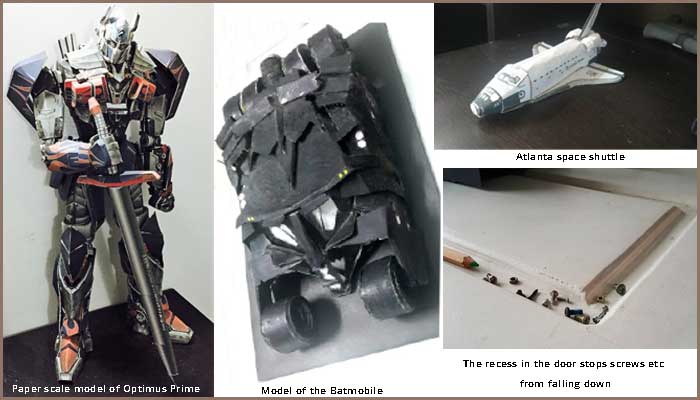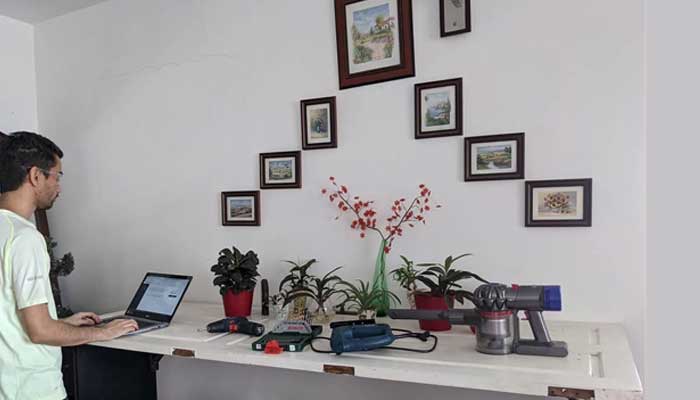A hardware hobbyist, fitness concerns and a lockdown come together to create Josh Elias Joy’s quirky solution.
It is said that one of the sure signs of being a geek is when you secretly wish the GitHub doubles up as a dating site. Jokes apart, you are a certified geek when you build your own computer interface. And a drum roll is definitely in order if you win not one but two contests consecutively for an out-of-the-box design.
All Work and All Play
For self-confessed “tinkerer of hardware and software”, Josh Elias Joy, a contest such as the ‘Odd Inputs and Peculiar Peripherals’ conducted by Hackaday.io seemed like the right thing to participate in. Hackaday.io, which is the single largest online repository of Open Hardware Projects conducts a bunch of bimonthly contests around various themes such as Halloween Hacker fest, the Earth Day challenge, the ‘Odd Inputs and Peculiar Peripherals’ contest and so on. The latter invites true geeks who have undergone the mandatory “rite of passage” of building their own custom keyboard, a mouse and other hardware trappings to fashion their strangest, fanciest, flashiest and most custom build ever. Josh who is a First year MTech student of Product Design and Management converted his old exercise bike into a wireless gamepad with the help of a ESP32 microcontroller thus emerging as one of the three winners entitled to a $150 shopping spree on Digi-key.
The ESP32-turned-Bluetooth gamepad that was hooked up to a homebrew cadence sensor not only grabbed eyeballs at Hackaday’s event but also at the Instructables Circuits’ Remote Control contest sponsored by Autodesk. The Instructables is a community that invites ‘makers’ to explore, share and create their next project with them. Here Josh managed to snag the second prize that entails a $100 Digital Gift Card.
What Josh Made
Jolted by his own physical inactivity during the pandemic, Josh Joy turned to his old exercise bike only to find the motivation seriously lacking. “Exercise by itself is boring and instead of cycling, I was playing video games. I thought why not combine the two!,” he exclaims. He tried using the exercise bike as an input to control the racing car in a game. “Pedalling gave movement to the car,” he says, adding, “For steering either left or right, I used the metal touch pads that originally used to sense the heart rate but had long since stopped functioning. The bike essentially works like a gamepad.” With the addition of some extra controls like the joystick and other buttons, there was no stopping Josh from going full throttle! Despite its fanciful facade, the hack stands out for being inexpensive and affordable: requiring no more than Rs1500 worth of electronic components.
Surmounting Challenges
Speaking about the complexity of the project, Josh says that figuring out all the wiring was the toughest part for him. He had to dismantle the defunct display panel on the exerbike and ‘read’ signals from each wire. “When I started pedalling, I got a pulse from two wires. As I pedalled faster, the pulses also got faster and I realised that I could convert the pulses into acceleration.” Josh experimented with different hardware hacks before settling on his winning submission. “I even toyed with the idea of using weighing scales as accelerator pedals for the game,” he states.
A Maker At Heart
Josh was all of 8 when his nimble fingers began fashioning everyday objects out of cardboard and other materials. “I started building miniature furniture at first,” he says. It wasn’t long before he moved on to paper scale models of Optimus Prime (from the Transformers movie series), the Batmobile and for his 8th grade Science exhibition an amazing replica of the Atlantis space shuttle. However, it wasn’t until his engineering days that he began to tinker with hardware and electronic components. “For an event held in my BTech college, I created an interactive robot – a paper scale model of the movie character Bumblebee which could greet visitors with a “Hi” and wave to them”. His continued pursuits have now resulted in a fully-equipped workshop at home that boasts of a 3D printer, hardware, and electronic components. “For this project, I didn’t buy anything new, just used whatever was there,” he remarks.


Making Market-Aware Technologists
Josh has a BTech degree in Mechatronics – an interesting mix of Mechanical Engineering, Electronics and Computer Science. A ‘maker’ at heart, he took a break after a 2-year employment stint to dabble in various personal projects in his workshop. It was then that he heard of the first-of-its-kind post graduate programme at IIITH – the MTech in Product Design and Management (PDM). Josh hopes to convert some of his ideas into real products. Referring to the programme, he says, “As engineers, we all like to make things but don’t really know if it will add value to people and if they will buy them. This course is structured such that they guide you on validating ideas and productizing them, teaches you to do market research and so much more.” The current semester has him and his classmates busy with subjects such as product design workshop, where they get to design and fashion things with the help of the Makers Lab housed on campus. “We also learn about the design of wearable systems which I find very interesting,” he says.
As per Prof. Raghu Reddy, Head of the Software Engineering Research Centre, “The programme ensures that students from diverse backgrounds are admitted”. For example, in the current batches, there are students from Mechanical, Civil, Computer Science, as well as non-engineering backgrounds such as fashion technology. “Developing a product requires one to understand various aspects and work with people from different domains and there is a lot of peer learning due to the diversity of students admitted to the program. We hope to have many more “Josh’s” as part of this programme,” he adds.
In Pursuit Of Real-World Solutions
Alongside coursework, Josh continues to work on ‘sensible solutions’ – an umbrella term used by him to group solutions that promote sustainability. For instance, an unconventional way to measure water usage and soil parameters, an automated watering system for plants and more. “I’m also hoping to productize the exercise bike hack,” he adds. But for now, with the prize monies he will get, he’s been eyeing what has been touted as a ‘must-have tool for embedded engineers – the Nordic’s Power Profiler Kit II. “It helps you optimize battery-powered devices to last longer,” he grins.



Next post